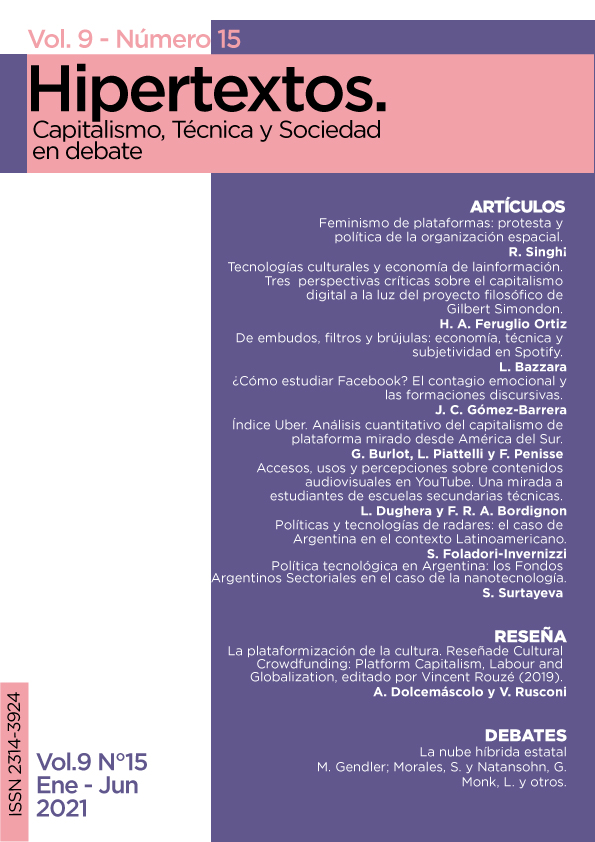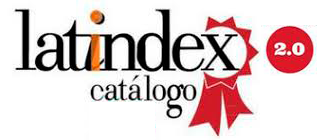De embudos, filtros y brújulas: economía, técnica y subjetividad en Spotify
DOI:
https://doi.org/10.24215/23143924e028Palabras clave:
Spotify, modelo de negocio, modelos algorítmicos, perfil, personalizaciónResumen
En el presente trabajo se optará por hacer un análisis en profundidad de Spotify, por tratarse de la máxima referencia entre las plataformas de streaming musical, hecho que se constata en su masividad de uso y posición de mercado. Esto no impedirá dar una definición lo suficientemente abarcativa que remita a las plataformas de streaming musical en general, pero tal definición funcionará como punto de partida desde el cual se examinará en detalle su caso económica y culturalmente más emblemático. De esta suerte, y sobre la base de la articulación que opera en Spotify entre economía, técnica y subjetividad, las preguntas que guiarán el desarrollo del trabajo serán: ¿Cuál es su modelo de negocios, o qué lógica de mercado pone en juego? ¿Cuál es su modelo subjetivo, o qué tipo de usuario u oyente ideal configura? Y ¿De qué tecnologías computacionales se vale para unir los intereses de las industrias y los usuarios? Como se verá, términos como freemium, machine learning, sistema de recomendación, perfil y personalización resultarán claves para desentrañar esta lógica de plataforma.
Descargas
Citas
Arcila-Calderón, C., Sánchez-Holgado, P. y Ordóñez González K. (2019). Las plataformas de entretenimiento on-demand: detrás del Machine Learning de Netflix, HBO y Spotify. En Romero Rodríguez, L.M. y Rivera Rogel, D.E. (Coords.). La comunicación en el escenario digital. Actualidad, retos y prospectivas (pp. 645-669). Pearson. http://tec-comunicacion.unsl.edu.ar/Tecno%20I/2019/Teor%EDas/Documentos/La_comunicacion_en_el_escenario_digital.pdf
Arrese, A. (2004). Algunas consideraciones sobre la gestión de productos y contenidos de los medios. Comunicación y sociedad, XVII (2), 9-44.
Becerra, M., Labate, C., Lozano, L., Marino, S. y Mastrini, G. (2013). Abordajes sobre el concepto de ‘concentración’. En Mastrini, G., Bizberge, A. y de Charras, D. (Eds.). Las políticas de comunicación en el Siglo XXI. Nuevos y viejos desafíos (pp. 139-174). La Crujía.
Chevalier Naranjo, S. (2021). El steaming, una segunda vida para la industria musical. Statista. https://es.statista.com/grafico/9156/ingresos-del-mercado-mundial-de-la-musica-grabada/
Chodos, A.T. (2019). What does music mean to Spotify? An essay on musical significance in the era of digital curation. INSAM: Journal of Contemporary Music, Art and Technology, 1 (2), 36-64.
Deleuze, G. (1999). Posdata sobre las sociedades de control. En Ferrer, Christian (Comp). El lenguaje libertario. Antología del pensamiento anarquista contemporáneo (pp. 105-110). Altamira.
Eriksson, M. (2018). Unpacking Online Streams. APRJA, 7, (1). https://doi.org/10.7146/aprja.v7i1.115066
Eriksson, M., Fleischer, R., Johansson, A., Snickars, P. y Vonderau, P. (2019). Spotify Teardown. Inside the Black Box of Streaming Music. MIT Press.
García, J. (2020). Quién está ganando la guerra del streaming de música. Xataka. https://www.xataka.com/empresas-y-economia/quien-esta-ganando-guerra-streaming-musica
IFPI (2021). Global Music Report 2021. State of the Industry. https://www.ifpi.org/wp-content/uploads/2020/03/GMR2021_STATE_OF_THE_INDUSTRY.pdf
Kassabian, A. (2013). Introduction. Ubiquitous Listening: Affect, Attention and Distributed Subjectivity. University of California Press.
Lury, C. y Day, S. (2019). Algorithmic Personalization as a mode of individuation. Theory, Culture and Society, 0 (0), 1-21. https://doi.org/10.1177/0263276418818888
Monzoncillo, J. M. (2011). Las nuevas televisiones: personalización e individualización. La televisión etiquetada. Nuevas audiencias y nuevos negocios (pp. 83-101). Planeta.
Nylund Hagen, A. (2015). Using Music Streaming Services: Practices, Experiences and the Lifeworld of Musicking. [Tesis doctoral, Faculty of Humanities, University of Oslo]. https://www.academia.edu/21823524/Using_Music_Streaming_Services_Practices_Experiences_and_the_Lifeworld_of_Musicking
Ortelli, M. (2016). Radiohead. La banda del futuro. Página/12. https://www.pagina12.com.ar/diario/suplementos/radar/9-11510-2016-05-22.html
Pichl, M.; Zangerle, E. y Specht, G. (2015). Towards a context-aware music recommendation approach: what is hidden in the playlist name? IEEE 15th International Conference on Data Mining Workshop (pp. 1360-1365). DOI 10.1109/ICDMW.2015.145
Portugal, I., Alencar, P. y Cowan, D. (2018). The use of machine learning algorithms in recommender systems: A systematic review. arXiv, 4, 1-16. https://arxiv.org/ftp/arxiv/papers/1511/1511.05263.pdf
Prey, R. (2018). Nothing Personal. Algorithmic individuation on music streaming platforms. Media, Culture and Society, 40 (7), 1086-1100. Sage Publications. https://journals.sagepub.com/doi/full/10.1177/0163443717745147
Rodríguez, P. (2019). Las palabras en las cosas. Saber, poder y subjetivación entre algoritmos y biomoléculas. Cactus.
Rodríguez, P. (2018). Gubernamentalidad algorítmica. Sobre las formas de subjetivación en la sociedad de los metadatos. Revista Barda, 4, (6), 14-35. https://www.cefc.org.ar/assets/files/rodriguez.pdf
Rus, C. (2020). Spotify va a por todas con el podcast: compra Gimlet Media, una de las principales redes de podcast a nivel mundial. Xataka. https://www.xataka.com/servicios/spotify-va-a-todas-podcast-compra-gimlet-media-principales-redes-podcasts-a-nivel-mundial
Sanjinés Flores, D.E. (2019). Sistema para la Minería de Opiniones. Avances en Informática y Automática. Duodécimo Workshop (pp. 97-109). https://gredos.usal.es/handle/10366/139439
Spotify for Artists (2019). How ‘Fans Also Like’ Works. https://artists.spotify.com/blog/how-fans-also-like-works
Spotify Investors (2021). Press Release Details: Spotify Technology S.A. Announces Financial Results for First Quarter 2021. https://investors.spotify.com/financials/press-release-details/2021/Spotify-Technology-S.A.-Announces-Financial-Results-for-First-Quarter-2021/default.aspx
Spotify Labs (2020). For Your Ears Only: Personalizing Spotify Home With Machine Learning. https://labs.spotify.com/2020/01/16/for-your-ears-only-personalizing-spotify-home-with-machine-learning/
Spotify Technology S.A. (2018). Prospectus. Form F-1 Registration Statement. United States Securities and Exchange Comission. https://www.sec.gov/Archives/edgar/data/1639920/000119312518063434/d494294df1.htm
Srnicek, N. (2018). Capitalismo de plataformas. Caja Negra.
Sweney, M. (2018). Slipping discs: music streaming revenues of $6.6bn surpass CD sales. The Guardian. https://www.theguardian.com/technology/2018/apr/24/music-streaming-revenues-overtake-cds-to-hit-66bn
Terranova, T. (2017). “Red Stack Attack! Algoritmos, capital y la automatización del común”. Avanessian, A. y Reis, M. (Comps.). Aceleracionismo. Estrategias para una transición hacia el postcapitalismo. Caja Negra.
Vonderau, P. (2017). The Spotify Effect: Digital Distribution and Financial Growth. Television and New Media, 20, (1), 1-17. https://www.academia.edu/35208651/The_Spotify_Effect_Digital_Distribution_and_Financial_Growth
Wang, A. (2019). ‘Spotify Teardown’ Is The Book Spotify Didn’t Want Published. Rolling Stone. https://www.rollingstone.com/pro/features/spotify-teardown-book-streaming-music-790174/
Wikström, P. (2014). La industria musical en una era de distribución digital. C@MBIO. 19 ensayos fundamentales sobre cómo internet está cambiando nuestras vidas. BBVA Open Mind. https://www.bbvaopenmind.com/libros/cambio-19-ensayos-fundamentales-sobre-como-internet-esta-cambiando-nuestras-vidas/
Yepes Vélez, A., López Batista V. y Moreno, M. (2019). Sistema de Recomendación de música Sensible al Contexto. Avances en Informática y Automática. Duodécimo Workshop (pp. 40-64). https://gredos.usal.es/handle/10366/139439

























